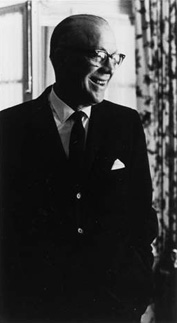 MILTON S. EISENHOWER, widely regarded as a leader of great vision, holds the distinction of having served two nonconsecutive terms as president of The Johns Hopkins University. After serving from 1956 to 1967–a period in which the university’s income tripled and the endowment doubled–he retired and was named president emeritus. During his tenure, the medical institutions underwent major expansion and a new library and athletic center were added at Homewood. He returned to the presidency again, in 1971-72, and is credited with restoring a sense of unity to the university. The youngest brother of U.S. President Dwight D. Eisenhower, Milton Eisenhower died in 1985.
MILTON S. EISENHOWER, widely regarded as a leader of great vision, holds the distinction of having served two nonconsecutive terms as president of The Johns Hopkins University. After serving from 1956 to 1967–a period in which the university’s income tripled and the endowment doubled–he retired and was named president emeritus. During his tenure, the medical institutions underwent major expansion and a new library and athletic center were added at Homewood. He returned to the presidency again, in 1971-72, and is credited with restoring a sense of unity to the university. The youngest brother of U.S. President Dwight D. Eisenhower, Milton Eisenhower died in 1985.
Krieger-Eisenhower Professorships
Zanvyl Krieger School of Arts and Sciences
Interdisciplinary
Established in 1993 by Zanvyl Krieger in honor of Milton S. Eisenhower
Held by Michael J. Williams
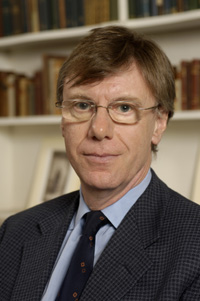 MICHAEL J. WILLIAMS is a Krieger-Eisenhower Professor and a Fellow of the American Academy of Arts and Sciences. From 2001 to 2013 he served as chair of the department. Before coming to Johns Hopkins, he taught at Yale, the University of Maryland, and Northwestern. He has been the recipient of an NEH fellowship and has held visiting positions at several universities including Chicago, Michigan, Oxford, Pennsylvania, and MIT. Professor Williams lectures frequently nationally and internationally. His main areas of interest are epistemology (with special reference to skepticism), philosophy of language, and the history of modern philosophy. In addition to numerous articles, he is the author of Groundless Belief (1977; 2nd edition 1999), Unnatural Doubts (1992; 2nd edition 1996) and Problems of Knowledge (2001). He is currently working on Curious Researches: Reflections on Skepticism Ancient and Modern.
MICHAEL J. WILLIAMS is a Krieger-Eisenhower Professor and a Fellow of the American Academy of Arts and Sciences. From 2001 to 2013 he served as chair of the department. Before coming to Johns Hopkins, he taught at Yale, the University of Maryland, and Northwestern. He has been the recipient of an NEH fellowship and has held visiting positions at several universities including Chicago, Michigan, Oxford, Pennsylvania, and MIT. Professor Williams lectures frequently nationally and internationally. His main areas of interest are epistemology (with special reference to skepticism), philosophy of language, and the history of modern philosophy. In addition to numerous articles, he is the author of Groundless Belief (1977; 2nd edition 1999), Unnatural Doubts (1992; 2nd edition 1996) and Problems of Knowledge (2001). He is currently working on Curious Researches: Reflections on Skepticism Ancient and Modern.
Held by Michela Gallagher
 MICHELA GALLAGHER, PH.D., has research program that is broadly based in the area of systems neuroscience using animal models (rats and mice) as well as studies in humans; an area of special emphasis is neurocognitive aging. Over the lifespan, a genetically determined program of development, maturation, and senescence interacts with a complex array of environmental experiences and exposures that make up the life history of the individual.
MICHELA GALLAGHER, PH.D., has research program that is broadly based in the area of systems neuroscience using animal models (rats and mice) as well as studies in humans; an area of special emphasis is neurocognitive aging. Over the lifespan, a genetically determined program of development, maturation, and senescence interacts with a complex array of environmental experiences and exposures that make up the life history of the individual.- She studies the neurobiological basis for widely differing outcomes at older ages, cognitive impairment on the one hand and well-preserved cognitive function on the other, the latter sometimes referred to as “successful aging.” She heads a diverse team of researchers that study these neurobiological mechanisms in rats, mice, and humans, and leads a series of studies to test treatments in animals as well as a clinical trial in humans designed to improve memory function in older adults who suffer from memory problems such as patients with mild cognitive impairment who are at risk for Alzheimer’s disease.
- Her basic research has been supported for over 20 years by the National Institute on Aging. Her clinical research in humans is currently supported by a Grand Opportunity Award, a stimulus-funded research grant under the American Recovery and Reinvestment Act of 2009. She also heads the Neurogenetics and Behavior Center at Johns Hopkins University, an innovative resource to study mice with targeted genetic manipulations at high levels of cognitive/affective function, founded with funding by the National Center for Research Resources.
Held by William E. Connolly
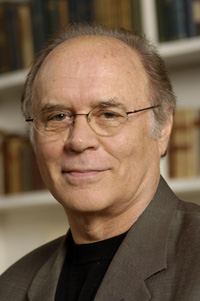 William E. Connolly is Krieger-Eisenhower Professor at Johns Hopkins, where he teaches political theory. His early book, The Terms of Political Discourse, was awarded the Benjamin Lippincott Award in 1999 as “a work of exceptional quality that is still considered significant at least 15 years after publication.” In a poll of American political theorists published in PS in 2010, he was ranked the fourth most influential political theorist in America over the last twenty years, after Rawls, Habermas, and Foucault. He has been a Fellow at Nuffield College, Oxford, the Institute for Advanced Study, the Stanford Center for Behavioral Studies, and a Leverthulme scholar stationed in Exeter College. He is co-moderator of the Blog The Contemporary Condition, where he posts regularly on current issues, particularly on the dangers of fascism and the bumpy relations between capitalist greenhouse emissions in temperate zone states and impersonal planetary amplifiers that both boost the effects and tend to distribute them disproportionately to nontemperate regions.
William E. Connolly is Krieger-Eisenhower Professor at Johns Hopkins, where he teaches political theory. His early book, The Terms of Political Discourse, was awarded the Benjamin Lippincott Award in 1999 as “a work of exceptional quality that is still considered significant at least 15 years after publication.” In a poll of American political theorists published in PS in 2010, he was ranked the fourth most influential political theorist in America over the last twenty years, after Rawls, Habermas, and Foucault. He has been a Fellow at Nuffield College, Oxford, the Institute for Advanced Study, the Stanford Center for Behavioral Studies, and a Leverthulme scholar stationed in Exeter College. He is co-moderator of the Blog The Contemporary Condition, where he posts regularly on current issues, particularly on the dangers of fascism and the bumpy relations between capitalist greenhouse emissions in temperate zone states and impersonal planetary amplifiers that both boost the effects and tend to distribute them disproportionately to nontemperate regions.
In 2017 he was presented the Distinguished Scholar Award by the International Studies Association for his body of work on the new pluralism, secularism, global capitalism, and impersonal planetary processes. In 2020 the Western Political Science Association announced the William E. Connolly Award to be given yearly for the best paper in political theory. His 2022 book, entitled Resounding Events: Adventures of an Academic from the Working Class, was named co-winner of the David Easton Award in 2023, presented by the Foundations of Political Theory. A new book is out for review. It is entitled Transfiguring Western Cosmologies: Pagan Vitalities, Christian/Settler Legacies, and the Time of Climate Wreckage.
Held by Robert A. Moffitt
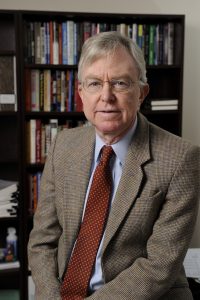 ROBERT A. MOFFITT, a Krieger-Eisenhower Professor, joined Hopkins’ Department of Economics in 1995, and holds a joint appointment in the Bloomberg School of Public Health’s Department of Population, Family and Reproductive Health. He has served as chief editor of American Economic Review and received the Award for the Best Journal Article from the Society for Research on Adolescence Social Policy. He is also the recipient of a MERIT Award from the National Institutes of Health for his research on welfare and the family. He is best known for his research on the economic consequences of welfare and other anti-poverty programs on work effort, marriage and childbearing, and on trends in poverty in the U.S. and has published more than 100 research articles in scholarly journals. He is an elected member of the National Academy of Sciences, the American Academy of Arts and Sciences, a Fellow of the Econometric Society, and is the recipient of a Guggenheim Fellowship.
ROBERT A. MOFFITT, a Krieger-Eisenhower Professor, joined Hopkins’ Department of Economics in 1995, and holds a joint appointment in the Bloomberg School of Public Health’s Department of Population, Family and Reproductive Health. He has served as chief editor of American Economic Review and received the Award for the Best Journal Article from the Society for Research on Adolescence Social Policy. He is also the recipient of a MERIT Award from the National Institutes of Health for his research on welfare and the family. He is best known for his research on the economic consequences of welfare and other anti-poverty programs on work effort, marriage and childbearing, and on trends in poverty in the U.S. and has published more than 100 research articles in scholarly journals. He is an elected member of the National Academy of Sciences, the American Academy of Arts and Sciences, a Fellow of the Econometric Society, and is the recipient of a Guggenheim Fellowship.
Held by Paul Smolensky
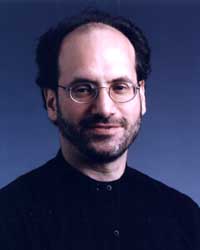 PAUL SMOLENSKY has research that focuses on integrating symbolic and neural network computation for modeling reasoning and, especially, grammar in the human mind/brain. The work is formal and computational, with emerging applications to neuroscience and applied natural language processing. His research has primarily addressed issues of representation and processing rather than learning. Principal contributions (see Publications tab) are to linguistic theory, the theory of vectorial neural network computation, and the philosophical foundations of cognitive science. During Fall semesters he is on leave from Johns Hopkins, working at Microsoft Research in Redmond, Washington (for a non-technical synopsis of some of his recent work there, see this link: Mind/Brain Networks).
PAUL SMOLENSKY has research that focuses on integrating symbolic and neural network computation for modeling reasoning and, especially, grammar in the human mind/brain. The work is formal and computational, with emerging applications to neuroscience and applied natural language processing. His research has primarily addressed issues of representation and processing rather than learning. Principal contributions (see Publications tab) are to linguistic theory, the theory of vectorial neural network computation, and the philosophical foundations of cognitive science. During Fall semesters he is on leave from Johns Hopkins, working at Microsoft Research in Redmond, Washington (for a non-technical synopsis of some of his recent work there, see this link: Mind/Brain Networks).
Prior to joining the faculty of the Cognitive Science Department at Johns Hopkins, he was a professor in the Computer Science Department and Institute of Cognitive Science at the University of Colorado Boulder. He had been a postdoc at the Center for Cognitive Science at the University of California at San Diego, where he was a founding member of the Parallel Distributed Processing Research Group and worked with Dave Rumelhart, James McClelland, and Geoff Hinton. (He also contributed to the User-Centered System Design group led by Don Norman.) His degrees are an A.B. in Physics from Harvard and, from Indiana University, Bloomington, a M.S. in Physics and a Ph.D. in Mathematical Physics.
Held by Robert Lieberman
 ROBERT LIEBERMAN, Ph.D., is the Krieger-Eisenhower Professor of Political Science at Johns Hopkins University. He studies American political development, race and American politics, and public policy. He has also written extensively about the development of American democracy and the links between American and comparative politics.
ROBERT LIEBERMAN, Ph.D., is the Krieger-Eisenhower Professor of Political Science at Johns Hopkins University. He studies American political development, race and American politics, and public policy. He has also written extensively about the development of American democracy and the links between American and comparative politics.
His most recent book is Four Threats: The Recurring Crises of American Democracy (St. Martin’s Press, 2020), co-authored with Suzanne Mettler. His first book, Shifting the Color Line: Race and the American Welfare State (Harvard University Press, 1998), won the Social Science History Association Presidential Book Award, the Thomas J. Wilson Prize of Harvard University Press, and Columbia University’s Lionel Trilling Award. Shaping Race Policy: The United States in Comparative Perspective (Princeton University Press, 2005) was awarded the Best Book Prize by the Race, Ethnicity, and Politics Section of the American Political Science Association. He is also the co-editor of Democratization in America: A Comparative-Historical Analysis (Johns Hopkins University Press, 2009), Beyond Discrimination: Racial Inequality in a Postracist Era (Russell Sage Foundation, 2013), and The Oxford Handbook of American Political Development (Oxford University Press, 2016).
He is a co-convenor of the American Democracy Collaborative and chaired the American Political Science Association Task Force on New Partnerships. He has received fellowships from the Russell Sage Foundation and the American Philosophical Society. In 2021, he will be the John G. Winant Visiting Professor of Government at the University of Oxford.
Lieberman previously served as provost and senior vice president of academic affairs of Johns Hopkins from 2013-2016. As provost, he oversaw implementation of the Bloomberg Distinguished Professorships; the Catalyst and Discovery awards, which reward innovative early-career research and distinguished cross-divisional collaboration, and the President’s Frontier Award, given annually to a faculty member who demonstrates significant scholarly achievement and exceptional promise for important future work. He also led the development of the university’s Faculty Diversity Initiative and worked to enhance the university’s practices and accountabilities around equity issues. Before coming to Johns Hopkins, he was on the faculty of Columbia University, where he served from 2012-13 as interim dean of the School of International and Public Affairs.
Held by Peter Achinstein
 PETER ACHINSTEIN, Ph.D., is a Krieger-Eisenhower professor of philosophy. He specializes in philosophy of science and has interests in the history of science as well. In addition to numerous articles and reviews in these fields, he is the author of Concepts of Science (1968), Law and Explanation (1971), The Nature of Explanation (1983), and Particles and Waves (1991). The latter, which received the Lakatos Award, is a study of methodological problems arising from three episodes in 19th-century physics: the wave-particle debate about light, the development of the kinetic-molecular theory, and the discovery of the electron. Recent publications include The Book of Evidence (2001), which develops a theory of scientific evidence and applies it to cases in the history of science, Science Rules: A Historical Introduction to Scientific Methods (2004), Scientific Evidence (2005), and Evidence, Explanation, and Realism (2010), which is a collection of his essays. In 2011, he was honored by a festschrift, Philosophy of Science Matters: The Philosophy of Peter Achinstein. This contains 20 papers on his work by former students and other important writers. Evidence and Method (2013) discusses the scientific methods of Isaac Newton and James Clerk Maxwell. In 2018 he published Speculation: Within and About Science, which raises the question of what a scientific speculation is, and whether and when speculating is ever legitimate in science. He has held Guggenheim, NEH, and NSF fellowships, and has served as a visiting professor at MIT, Stanford, and the Hebrew University of Jerusalem. He is a founder and director of the Johns Hopkins Center for History and Philosophy of Science.
PETER ACHINSTEIN, Ph.D., is a Krieger-Eisenhower professor of philosophy. He specializes in philosophy of science and has interests in the history of science as well. In addition to numerous articles and reviews in these fields, he is the author of Concepts of Science (1968), Law and Explanation (1971), The Nature of Explanation (1983), and Particles and Waves (1991). The latter, which received the Lakatos Award, is a study of methodological problems arising from three episodes in 19th-century physics: the wave-particle debate about light, the development of the kinetic-molecular theory, and the discovery of the electron. Recent publications include The Book of Evidence (2001), which develops a theory of scientific evidence and applies it to cases in the history of science, Science Rules: A Historical Introduction to Scientific Methods (2004), Scientific Evidence (2005), and Evidence, Explanation, and Realism (2010), which is a collection of his essays. In 2011, he was honored by a festschrift, Philosophy of Science Matters: The Philosophy of Peter Achinstein. This contains 20 papers on his work by former students and other important writers. Evidence and Method (2013) discusses the scientific methods of Isaac Newton and James Clerk Maxwell. In 2018 he published Speculation: Within and About Science, which raises the question of what a scientific speculation is, and whether and when speculating is ever legitimate in science. He has held Guggenheim, NEH, and NSF fellowships, and has served as a visiting professor at MIT, Stanford, and the Hebrew University of Jerusalem. He is a founder and director of the Johns Hopkins Center for History and Philosophy of Science.
Held by Yingyao Hu
 YINGYAO HU, Ph.D., is the Krieger-Eisenhower Professor of Economics and chair of the economics department at Johns Hopkins University where he has worked as a professor of economics since 2007.
YINGYAO HU, Ph.D., is the Krieger-Eisenhower Professor of Economics and chair of the economics department at Johns Hopkins University where he has worked as a professor of economics since 2007.
Before joining Hopkins, Dr. Hu was an assistant professor of economics at the University of Texas at Austin for four years. He is a Hopkins alumnus with an MSE in mathematical science and an MA in economics in 2001, and a PhD in economics in 2003. He also studied at Michigan State University, Fudan University in Shanghai, and Tsinghua University in Beijing.
Dr. Hu’s research interests include micro-econometrics, empirical industrial organization, and labor economics. In micro-econometrics, his research has focused on the nonparametric identification and estimation of measurement error models, mixture models, panel data model with fixed effects or unobserved covariates, and, generally, microeconomic models with latent variables. He is particularly interested in application-oriented econometrics, where the econometric methods are closely integrated with the economic theory or story. In empirical industrial organization, Dr. Hu work on unobserved heterogeneity in auction models, dynamic models with unobserved state variables, belief updating in learning models, estimation of production functions, and dynamic discrete choice with subjective belief. In labor economics, his research has concerned the US unemployment rates after correcting the self-reporting errors in the Current Population Survey, reliable estimates of China’s unemployment rates in a long period, and the impact of hurricanes on the fertility on the east coast of the United States.
Dr. Hu has published in many leading journals in economics and statistics, such as American Economic Review, Econometrica, Journal of the American Statistical Association, Journal of Econometrics, Games and Economic Behavior, Journal of Population Economics, and Journal of Comparative Economics. He is a fellow of the Journal of Econometrics and have served on the editorial boards of several journals. He was also a co-editor of a Journal of Econometrics special issue on measurement errors.
Held by Mark Christian Thompson
 MARK CHRISTIAN THOMPSON, Ph.D., is Krieger-Eisenhower Professor, professor of English, and chair of the English department at Johns Hopkins. His research and teaching concentrate in African American literature and philosophy, twentieth-century German philosophy, Kafka, the philosophy of race, and jazz studies. He is the author of five books: Black Fascisms: African American Literature and Culture between the Wars (2007); Kafka’s Blues: Figurations of Racial Blackness in the Construction of an Aesthetic (2016); Anti-Music: Jazz and Racial Blackness in German Thought between the Wars (2019); Phenomenal Blackness: Black Power, Philosophy, and Theory (2022); and The Critique of Nonviolence: Martin Luther King, Jr., and Philosophy (2022).
MARK CHRISTIAN THOMPSON, Ph.D., is Krieger-Eisenhower Professor, professor of English, and chair of the English department at Johns Hopkins. His research and teaching concentrate in African American literature and philosophy, twentieth-century German philosophy, Kafka, the philosophy of race, and jazz studies. He is the author of five books: Black Fascisms: African American Literature and Culture between the Wars (2007); Kafka’s Blues: Figurations of Racial Blackness in the Construction of an Aesthetic (2016); Anti-Music: Jazz and Racial Blackness in German Thought between the Wars (2019); Phenomenal Blackness: Black Power, Philosophy, and Theory (2022); and The Critique of Nonviolence: Martin Luther King, Jr., and Philosophy (2022).